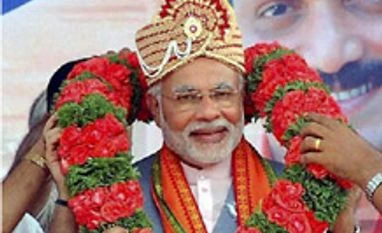"It isn't a wave. It is a tsunami in favour of Narendra Modi," said a journalist friend just back from Western Uttar Pradesh. "Bunkum. I couldn't sense any hawa for Modi in Eastern UP," another told me. A politician likened the 'wave' to "loo", the warm summer winds that blow across North India, which has made all of Modi's opponents sweat.
Determining a wave - for journalists, pollsters and politicians alike - has been a difficult proposition ever since the first wave elections of 1971.
Few gauged Indira Gandhi's 'Garibi Hatao' wave in 1971, particularly as it came after the 1967 elections when several states across India rejected Congress governments and the 1969 split in the Congress. Similarly, not many detected the anti-Emergency wave in favour of the Janata Party in the run up to the 1977 elections. It showed itself, at least in the north of the Vindhyas, in all its glory only on the day of the poll. In 1984, the opposition was convinced it was doing reasonably well. But the sympathy wave for Rajiv Gandhi, after the assassination of his mother Indira, made the Congress cross 400-seats and completely knocked out the opposition.
More From This Section
The 1984 polls were also the last time an election wave traversed the entire country or sizeable parts of it. No single party or pre-poll alliance has crossed the 272 mark in the Lok Sabha ever since. The best performances being that of the Congress with 220-odd seats in 1991, 206-seats in 2009 and the BJP's 182-seats in 1998.
So, will we see 1984, 1977 or 1971 like wave in 2014? The only other time that so many agreed a 'wave' existed even before the votes were polled was 2004. Everybody, including the opposition Congress, were convinced the BJP was returning to power on the strength of its 'India Shining' campaign. This time, many are convinced that the BJP will notch up enough seats to reach near the 272+ mark.
However, independent India's history tells us that there is a life beyond a 'wave', and not a very happy one for the parties and leaders that fell on the right side of the wave. Governments in the wake of a 'wave' victory have nearly always, found themselves buried under the weight of expectations and their arrogance.
It didn't take Indira Gandhi in 1971, the Janata Party government in 1977 and Rajiv in 1984 much time to lay waste to their resounding victories. The 1971 victory culminated in the Emergency of 1975. The 1977 experiment ended in infighting, collapse of that government and in less than three years with the return of Indira by January 1980. Rajiv squandered his 1984 triumph on Bofors and dozen other scams and controversies.
There is a recent example of how the prospect of a 'wave' can make even the most balanced politicians lose their minds. The Aam Aadmi Party (AAP) was so taken in by the response it received from people across India in the wake of its Delhi victory that it was in a tearing hurry to quit the Delhi government in the hope to more efficiently exploit the "tsunami" - as an insider then told me - in its favour. Party leader Arvind Kejriwal now concedes to the party 'sacrificing' its government in Delhi was a misstep.
As for the current wave, a group of dalit rickshaw pullers in Lucknow gave me an abject lesson in how difficult it can be to determine the presence or absence of a wave. The group insisted there indeed was a Modi wave. One of them, a day later after some familiarity and as he dropped me to the railway station, confessed that his vote was unlikely to go to Modi. "The BJP is a baniya party here. If they come to power prices will go up," he said. So, why did he and his entire group claimed Modi might win. "Most of my passengers are happier if I tell them there is indeed a Modi wave and even we (dalits) would vote for him," he said.
)